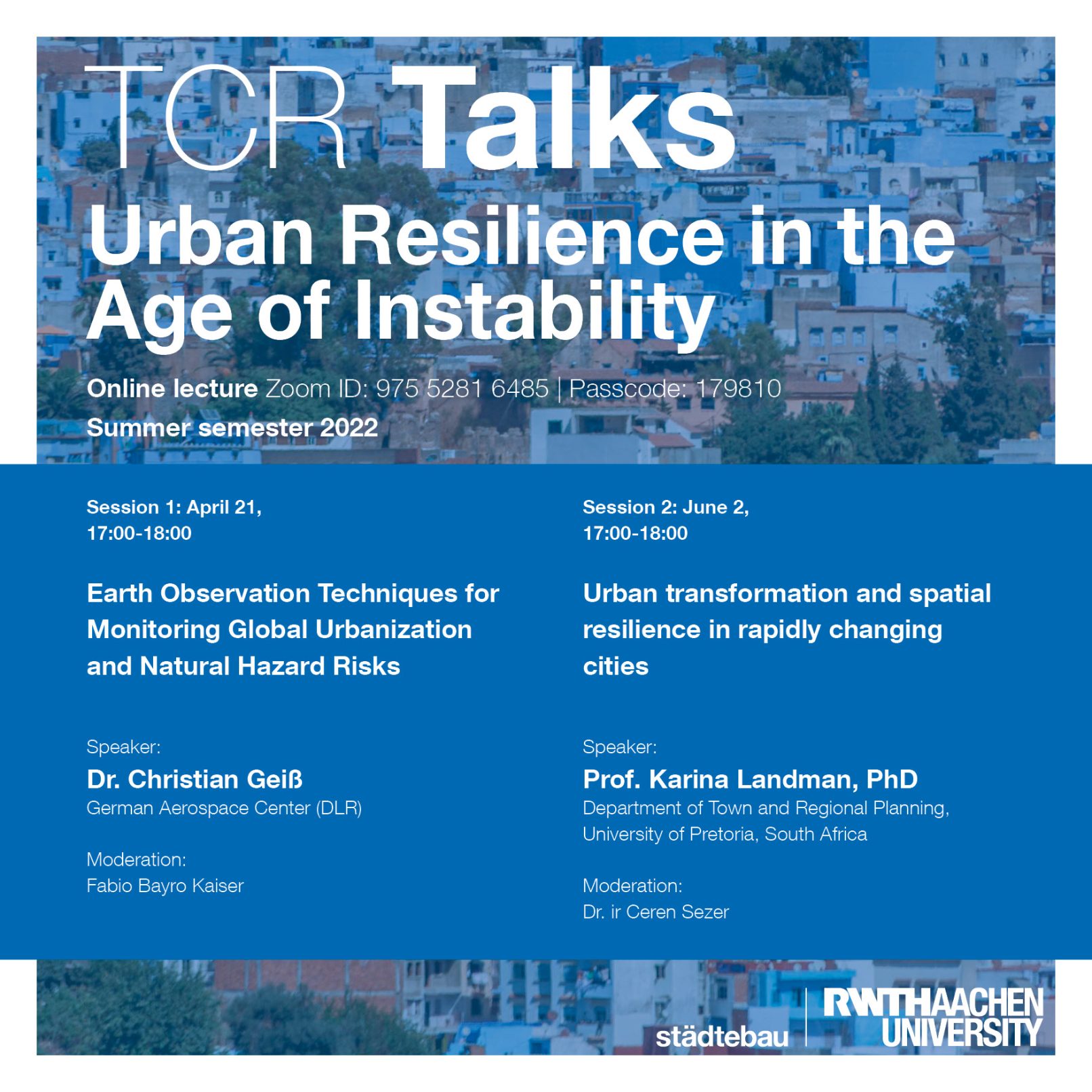TCR Talk Urban Resilience in the Age of Instability
TCR Talks – Winter Semester 22/23
The concept of urban resilience has received increasing attention in both public and policy debates and agendas. Urban resilience refers to the capacity of urban and rural areas, individuals and communities, governments and organisations to absorb the instabilities when they face major shocks, stresses and uncertainty. The most recent examples of these conditions include the Covid 19 pandemic, flooding in Europe and Asia, and forest fires worldwide.
The TCR Talks summer 2022 brings experts from various disciplines and domains to reflect on the mechanisms of resilience in the context of instability.
Session 1: April 21, 17:00-18:00
Earth Observation Techniques for Monitoring Global Urbanization and Natural Hazard Risks
Global urbanization processes and rising population numbers are reshaping the surface of our planet. Natural hazards such as earthquakes, which had only a minor impact in the past when they hit sparsely populated and spatially fragmented settlement areas, now affect cities with millions of people. Consequently, more people will likely be harmed by natural disasters in the 21st century than in the past. New techniques from the field of artificial intelligence in combination with data from earth observation satellites allow refined analyses to monitor global urbanization processes and assess natural hazard-related risks with unprecedented accuracy. This in turn allows for profound anticipation of the situation after various events and implementation of mitigation measures.
Speaker: Dr. Christian Geiß | German Aerospace Center (DLR)
Moderation: Fabio Bayro Kaiser
Session 2: June 2, 17:00-18:00
Urban transformation and spatial resilience in rapidly changing cities
Cities across the world are changing rapidly. Driven by population growth, migration, economic decline, political instabilities, and even more recently, the Covid-19 pandemic, urban systems and spaces are changing to accommodate moving people and new functions. Key to dealing with rapid change and urban transformation is the notion of adaptive capacity or resilience. Spatial resilience is an important dimension to consider in the quest to improve the adaptive capacity of human settlements a range of scales. This presentation will focus on the determinants of spatial resilience – diversity, redundancy, proximity, concentration, connectivity and modularity and the core considerations for their implementation in practice, namely context, scale and time. It argues that these spatial determinants should not work in isolation, but support each other to restructure cities in ways that would enable greater resilience through the interaction of flows, form and function in different contexts and at various scales across time.
Speaker: Prof Karina Landman, PhD | Department of Town and Regional Planning, University of Pretoria, South Africa
Moderation: Dr ir Ceren Sezer
Christian Geiß received the M.Sc. degree in applied geoinformatics from the Paris Lodron University of Salzburg, Salzburg, Austria, in 2010 and the Ph.D. degree (Dr. rer. nat.) from the Humboldt University of Berlin, Berlin, Germany, in 2014. Since 2010, he is with the German Remote Sensing Data Center (DFD) of the German Aerospace Center (DLR). In 2017, he was also with the Cambridge University Centre for Risk in the Built Environment (CURBE), University of Cambridge, UK, as a visiting scholar. He is currently pursuing a habilitation project in Geography with the Julius-Maximilians University of Würzburg, Würzburg, Germany, with the title “Collective Sensing Techniques and Artificial Intelligence for Natural Hazard Risk and Impact Assessment”. Consequently, his research interests include the development of machine learning methods for the interpretation of earth observation data, multimodal remote sensing of the built environment, exposure and vulnerability assessment in the context of natural hazards, as well as techniques for automated damage assessment after natural disasters.
Karina Landman is an Associate Professor at the University of Pretoria, South Africa and has a background in architecture, urban design and planning, with a PhD in urban design. Her research areas include urban transformation, gated communities, sustainable development – including resilient and regenerative cities, and public space. She has published widely on these issues, including a book entitled “Evolving Public Space in South Africa”, (2019).
